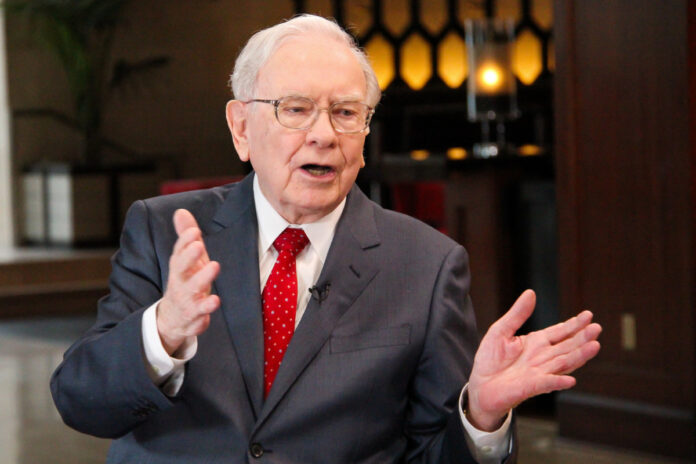Warren Buffett, the billionaire investor and CEO of Berkshire Hathaway, has again demonstrated why he’s rated as one of the world’s most astute minds in finance. As the stock market lurches in response to a tariff-induced meltdown, Buffett’s previous investment moves now seem all but prophetic. While most investors are left scrambling, Buffett remains steadfast—patiently sitting back, waiting, and positioning himself for the right moment to strike. Buffett waits for market crash moves.
Buffett’s Cash Play Pays Off
In 2024, when markets were soaring and investors were ecstatic, Buffett sat back quietly. Berkshire Hathaway shed an incredible $134 billion in stocks, well ahead of the present crisis. As of year-end, the company had a record $334 billion in cash nearly double last year’s. It was a decision few knew then, but now, with hindsight, it indicates that Buffett foresaw tough times to come.
A lot of that money is currently sitting in short-term Treasury bills, providing security and low returns. While the market crashes, Buffett’s reserve of treasuries is not only a precautionary measure—they’re a tactical advantage.
Selling High: The Apple Exit
Arguably the most dramatic action was Buffett’s sale of a significant amount of his Apple shares. Once Berkshire’s crown jewel, the firm sold almost two-thirds of its Apple holding during 2024. The move surprised people. But now that Apple stock has fallen 28% after suffering harsh tariff consequences, Buffett’s timing appears impeccable.
The technology industry, particularly those that are China-dependent such as Apple, is being severely impacted by U.S. tariffs. With a 54% tariff on Chinese imports and the looming threat of secondary tariffs up to 79%, Buffett’s exit from tech-heavy positions early on is a testament to his prescience.
Bank Stocks, Tech Titans—Cut with Precision
Berkshire didn’t stop with Apple. It also trimmed its exposure to banking behemoths like Bank of America and Citigroup. As of today, those stocks are off more than 20% in 2025. Those reasoned cuts highlight Buffett’s ability to see not only overvalued markets but also vulnerable sectors within changing economic environments.
As others pursued profits, Buffett made sure he wasn’t overexposed. It’s one of the reasons Buffett waits for market crash maneuvers while other people panic. He’d instead abstain from the mania than get in the tempest.
Tariffs Trigger Market Turmoil
President Donald Trump’s hawkish global tariffs declared as part of “Liberation Day” shook Wall Street. The S&P 500 plummeted 10% in only two trading sessions. The Nasdaq and Russell 2000 fell into bear market ground, each losing over 20% from recent highs.
The greater effect is daunting. U.S. markets lost more than $6 trillion of value in one week, their worst decline since the COVID-19 crash in 2020. Through this maelstrom, Buffett holds back, taking it easy while others perceive catastrophe alone.
Record Cash Pile and Treasury Gains
While others incur losses, Buffett’s cash position and treasury investments are earning income. In February, he wrote: “We were helped by a predictable large gain in investment income as Treasury Bill yields rose and we significantly expanded our holdings of these extremely-liquid short-term securities.”
This cash-first strategy not only safeguarded Berkshire’s fortune but also set it up to strike at undervalued properties when the moment arrives. Buffett waits for market crash moves not only with cash—but with patience to utilize it judiciously.
Will Buffett Make His Move Now?
With markets in free-fall and valuations plummeting, the speculation is starting to build: Is it time for Buffett to pounce? His record says he won’t act precipitously. Historically, Buffett moves when fear is greatest and prices are cheapest.
His stakes in rail, insurance, and energy are more dependent on the U.S. domestic economy have fared better. Berkshire’s Class B stock is 9% higher in 2025 despite the overall selloff. While other billionaires are seeing their fortunes dwindle, Buffett has increased his net worth by $12.7 billion, matching the net worth of Bill Gates at $155 billion.
Buffett Waits For Market Crash Moves: What’s Next?
As the world watches Wall Street’s freefall, one thing is certain—Buffett waits out market crash moves with the same calm resolve that has characterized his career. While panic fuels the headlines, Buffett is probably looking for long-term value under the ash. He doesn’t follow trends. He follows the opportunity.
With money in his pocket, insight born of decades of experience, and troubled markets, Buffett could soon make the sort of dramatic play that secures his legacy all over again.








